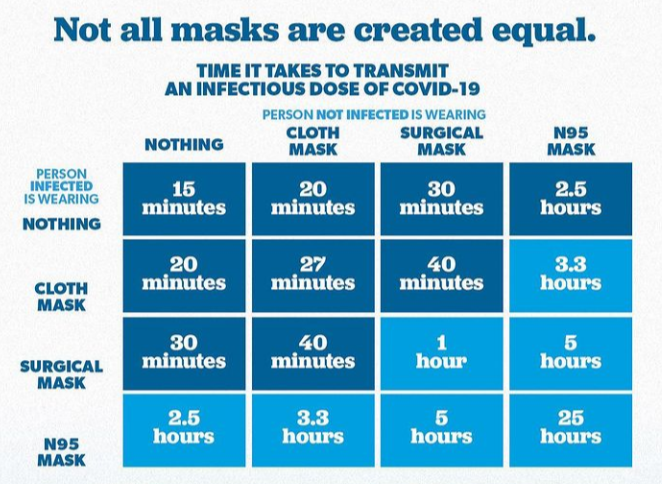
Not all masks are created equal. It is important that members (and students) understand that the medical masks the college is providing are not adequate protection based on health guidelines. This is concerning. The Joint Health and Safety Committees are addressing this issue and will be releasing a statement later this week.
To support our members, Local 417 has ordered KN95 masks. Under optimal circumstances, these masks are said to have a filtration level of at least 95%. We will be offering a small supply of these masks to ALL of our members to help keep you safe and healthy- whether you are working on campus or not. Information regarding safe distribution is forthcoming.
Masks alone are not enough. Please continue to social distance where possible and maintain regular handwashing habits as outlined by public health agencies.
Most of all, it is important to remember that workers still have the right to refuse unsafe work.
Read more in the Friday Digest from December 7: SLC Faculty Local 417 – Friday Digest for January 7 (campaign-archive.com)
UNDERSTANDING MASKS
Up until 2 years ago, many of us had never given facemasks much thought. Now, more than ever, we need to be informed and vigilant to protect ourselves and our loved ones. Below is a very brief over-view to help members make informed health decisions.
Cloth masks: Originally recommended when social distancing was not possible. A cloth mask is more to prevent the user from spreading the bulk of a sneeze or cough than protecting the wearer from harmful particles. Cloth masks are no longer sufficient to prevent the spread of recent Covid variants.

Surgical/medical masks: These masks come in a variety of ‘grades’ or ‘levels’.
Level 1: Usually white in colour. These are used when there is no concern of serious infection and the risk of airborne virus transmission is very low (e.g. NOT during a global pandemic).
Level 2: Usually blue in colour. These are used when there is no current outbreak of an airborne virus (not sufficient for highly contagious airborne viruses such as the Omicron variant).
Level 3: Usually purple in colour. These 4-ply masks are considered maximum barrier protection masks and can provide protection from airborne viruses if properly fitted.
KN95/N95: These masks fit more closely to the face than regular surgical masks and are rounded or ‘duck-billed’ in shape. If the mask is a legitimate KN95 or N95 mask that fits properly (no gaps around sides), it can filter 95% of “particulate matter”. Most harmful airborne particles will be stopped by this filter.
A few more notes:
- When purchasing masks, be cautious of ‘fakes’. There are a lot of counterfeit masks currently on the market that are useless. Therefore, do not purchase by colour alone, as this does not guarantee the level of protection the mask provides.
- Masks are intended to be single use. Do not place your surgical/medical masks in plastic to store and re-use.
- Try to fit the mask as closely to your face as possible. Gaps allow particles to by-pass the mask, limiting your protection.
